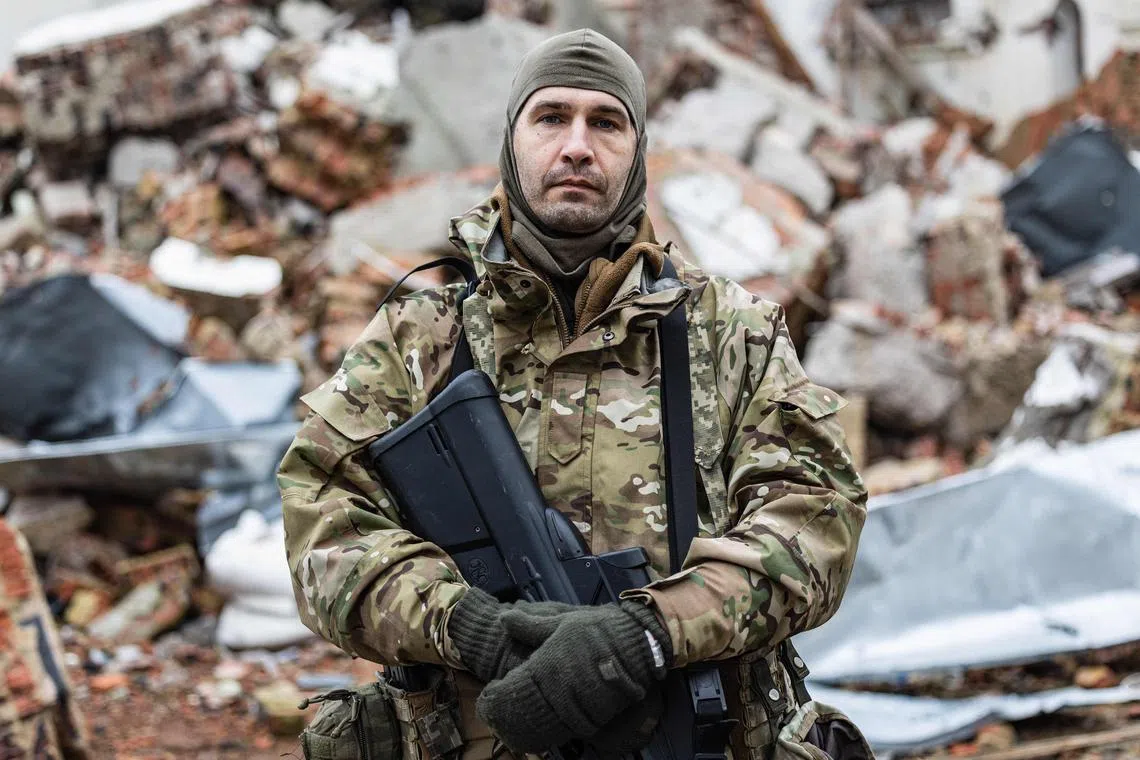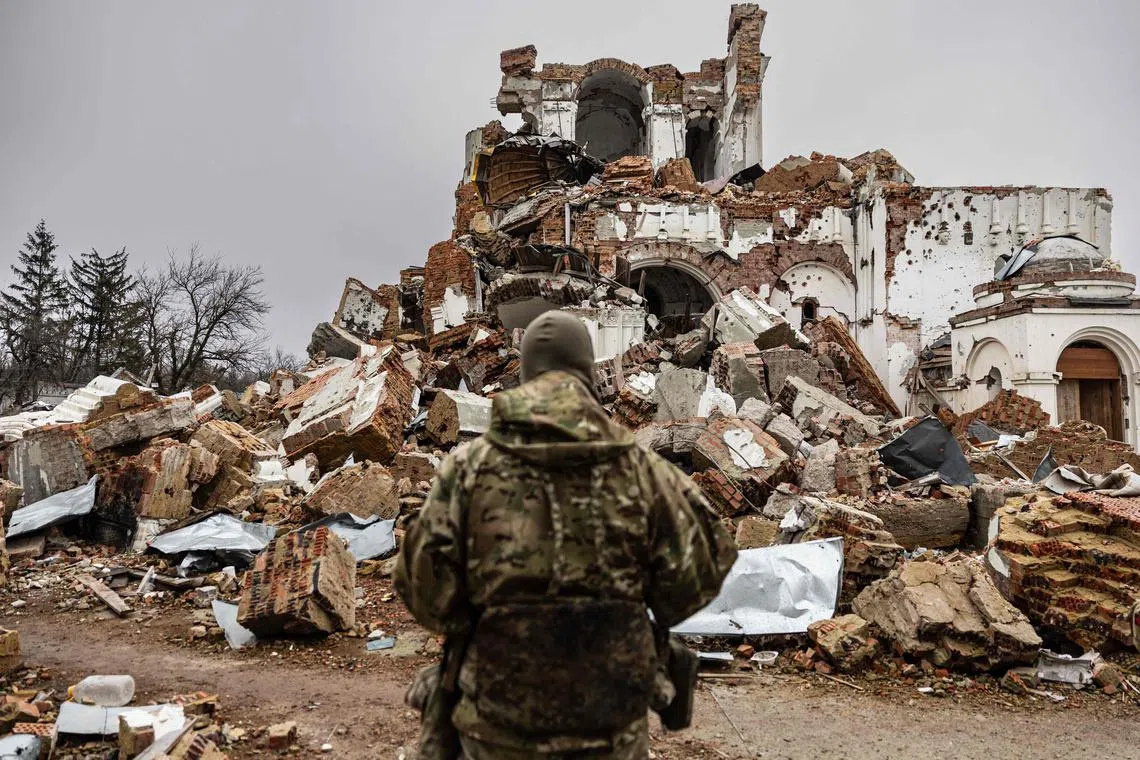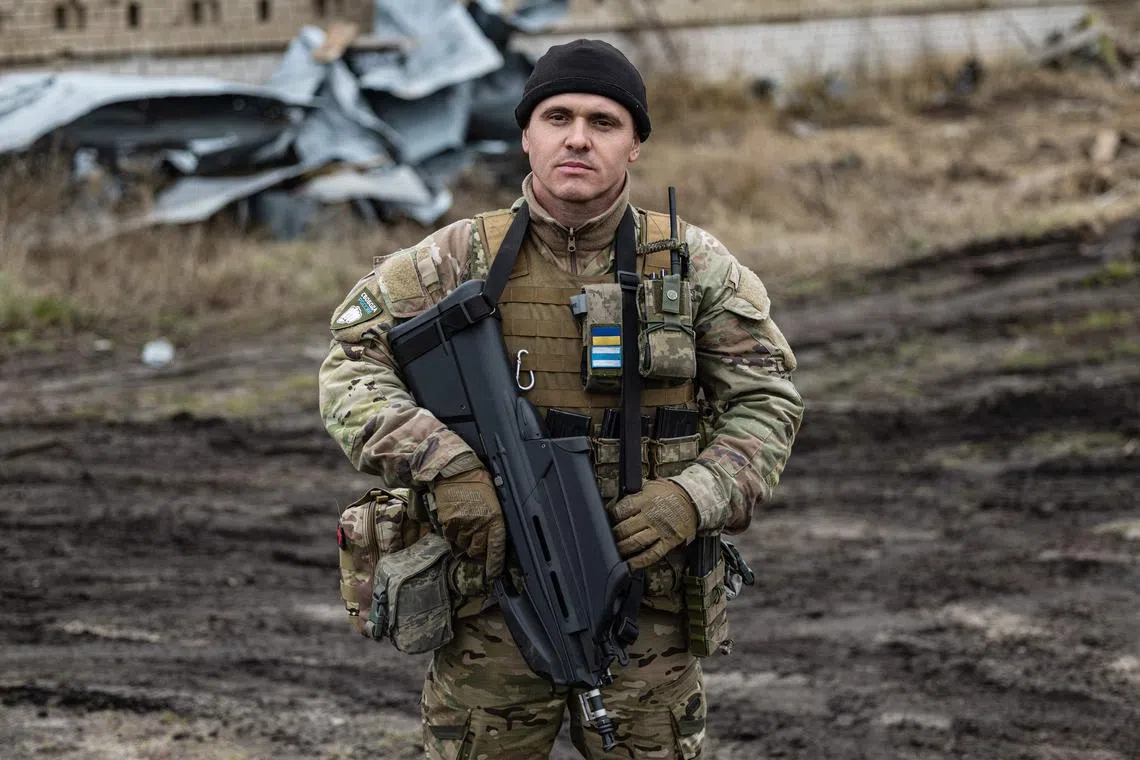'Not a traitor': The Russians fighting alongside Ukraine's forces
Sign up now: Get ST's newsletters delivered to your inbox

Caesar, a 50-year-old Russian, joined the Freedom of Russia Legion to fight on the side of Ukraine.
PHOTO: AFP
DOLYNA, Ukraine - For Russians who have been fighting on Ukraine’s side as part of the “Freedom of Russia” legion since President Vladimir Putin sent troops into Ukraine, secrecy is of the utmost importance.
The exact number of their personnel is strictly confidential, their positions are never disclosed, and their statements are carefully worded.
Their spokesman, who uses the nom de guerre Caesar, walks through what remains of an Orthodox monastery in Dolyna, a village in eastern Ukraine’s Donetsk region that was recaptured from Russian forces
Among its ruins are a shattered onion-shaped golden dome, a stucco lion and scattered religious icons - a scene of destruction that shows the world “what Putin’s values are”, Caesar says.
“I am not fighting my motherland. I am fighting against Putin’s regime, against evil,” he says, switching between Russian and English.
“I’m not a traitor. I’m a true Russian patriot who thinks about the future of my country.”
The legion created at the start of Russia’s invasion of Ukraine is part of the corps of international volunteers fighting with the Ukrainian army.
Its emblem features a clenched fist with the words “Russia” and “Freedom”.
According to Caesar, the legion boasts “several hundred” Russians who after two months of training were deployed in May to Ukraine’s industrial Donbas region, which Moscow is trying to conquer.
Some of its soldiers are now fighting in the town of Bakhmut on the eastern frontline, the scene of several months of fierce battles.
Under the command of Ukrainian forces, they are usually engaged in launching artillery.
“They are motivated and professional fighters, they do their job perfectly,” a Ukrainian officer tells AFP, speaking on condition of anonymity.
The recruits were subject to several rounds of interviews, psychological tests and even a polygraph to ensure their allegiance, the officer adds.

Caesar in front of a destroyed monastery in Dolyna, eastern Ukraine, on Dec 26.
PHOTO: AFP
Propaganda
The contribution of the Russian legion to the war effort is even more significant away from the battlefield, says military expert Oleg Zhdanov.
“They take part in the war, but do not have significant impact due to their small numbers,” Mr Zhdanov says.
“Their importance is more political. It’s good for Ukraine to be able to show that there are Russians who support democracy and freedom and who fight on the right side.”
On social media, the legion mainly posts propaganda videos and claims to have received thousands of applications.
Its members all have specific motivations for enlisting, some of them more personal than political.
A man who goes by the call sign “Tikhiy”, or “Silent”, is married to a Ukrainian he met in Russia, where they lived with their two children.

Tikhiy is married to a Ukrainian he met in Russia, where they lived with their two children.
PHOTO: AFP
They were visiting his wife’s family in Kyiv when Russia invaded.
“She wouldn’t have understood if we stayed in Russia,” says the man in his 40s from the southwestern Russian city of Tolyatti.
He has had barely any contact with his family back in Russia since the fighting began.
“They’ve been brainwashed a bit. But I know they’re worried about me,” he says.
As for his friends, “They are sitting on their couch in Russia and repeating: ‘We are going to liberate Ukraine,’“ he adds.
He considers the Russian soldiers as “enemies”, but while he has applied for Ukrainian citizenship, he won’t be able to obtain it until after the war is over.
“For the moment, I still have the enemy’s passport,” he says.
‘Russia is dying’
Caesar, the spokesman, used to work as a physiotherapist in Saint Petersburg, Russia’s former capital and second-largest city.
He says he has political motivations, describing himself as a “right-wing nationalist” who believes Mr Putin’s regime can only be overthrown by force.
He is unimpressed with Russian forces, calling them “puppets”, and says his countrymen “do not want to see or hear anything”.
“Russia is dying. Go to the villages, you will see drunks, drug addicts, criminals. People are suffering,” he adds.
It’s clear, he says, that Mr Putin’s two decades in power are to blame.
“His system, his government his deputies. All s**t. They are losers, corrupt, thieves, who only think of living for money and pleasure. It’s no way to run a country,” he adds.
After Moscow invaded on Feb 24,
“They too live in fear of the bombardments and in the cold, but they agree with my choices.” AFP


